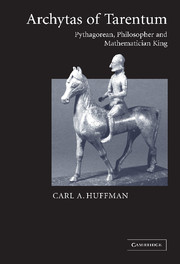Book contents
- Frontmatter
- Contents
- List of figures
- Preface
- PART ONE INTRODUCTORY ESSAYS
- I Life, writings and reception
- II The philosophy of Archytas
- III The authenticity question
- PART TWO GENUINE FRAGMENTS
- PART THREE GENUINE TESTIMONIA
- Appendix 1 Spurious writings and testimonia
- Appendix 2 Archytas' name
- Bibliography
- Select index of Greek words and phrases
- Index locorum
- General index
III - The authenticity question
Published online by Cambridge University Press: 04 August 2010
- Frontmatter
- Contents
- List of figures
- Preface
- PART ONE INTRODUCTORY ESSAYS
- I Life, writings and reception
- II The philosophy of Archytas
- III The authenticity question
- PART TWO GENUINE FRAGMENTS
- PART THREE GENUINE TESTIMONIA
- Appendix 1 Spurious writings and testimonia
- Appendix 2 Archytas' name
- Bibliography
- Select index of Greek words and phrases
- Index locorum
- General index
Summary
[Note: This discussion should be supplemented with the sections on authenticity in the commentary on each of the genuine fragments and testimonia and by the more detailed discussion of specific pseudo-Archytan treatises in the appendix on spurious writings.]
In the case of most ancient authors, if a medieval manuscript or an ancient source ascribes a given text to that author, we assume that the text is genuine until proven otherwise. There are of course works ascribed in the ancient tradition to prominent authors, such as Plato and Aristotle, which modern scholars with good reason regard as spurious. The number of genuine works of Plato and Aristotle, however, far outnumber works judged to be spurious. This situation is almost completely reversed in the Pythagorean tradition. Thesleff's collection of spurious Pythagorean texts (1965) runs to some 245 pages. Out of the forty-four authors listed in Thesleff, in the case of only two, Archytas and Philolaus, are most modern scholars willing to agree that even some authentic fragments also survive, although there are some reliable testimonia about a few others (e.g. Hippasus and Eurytus). In the case of Archytas there are approximately 45 pages and 1,200 lines of almost certainly spurious texts collected in Thesleff, in contrast to the 7 pages and 100 lines of text in DK, which most scholars have accepted as authentic. Thus, in terms of number of lines, the amount of authentic material is less than 10 percent of the amount of spurious material.
- Type
- Chapter
- Information
- Archytas of TarentumPythagorean, Philosopher and Mathematician King, pp. 91 - 100Publisher: Cambridge University PressPrint publication year: 2005

